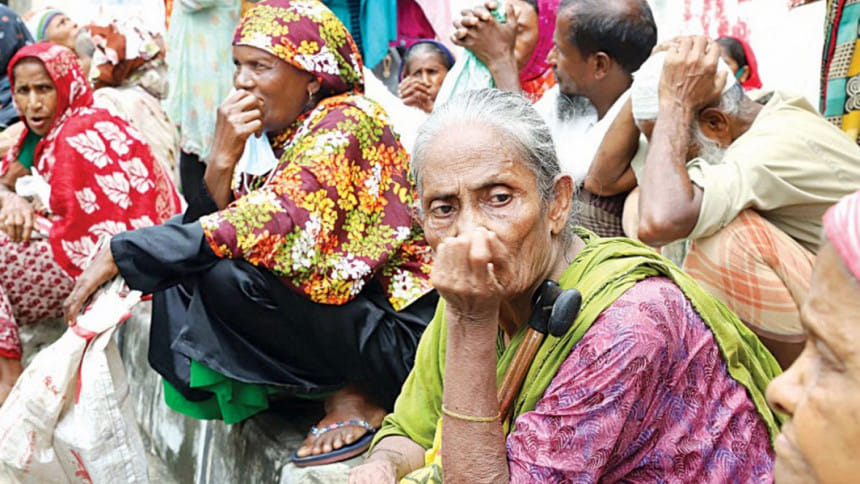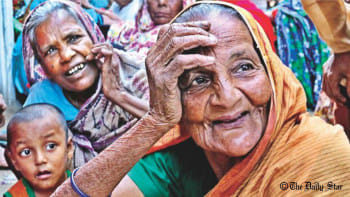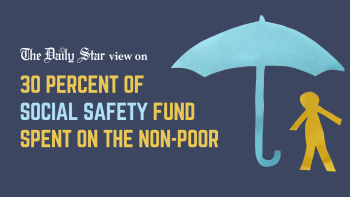Social registry will not solve the selection challenge in social welfare

Bangladesh launched a life cycle based social protection system following the adoption of the National Social Security Strategy (NSSS) in 2015 offering support to citizens in addressing the risks encountered at different stages of life, including pregnancy, early childhood, school age, working age and old age. The government has expanded coverage of social protection significantly in recent years. However, a key challenge remains in selecting the eligible persons to receive the benefits. According to 2016 Household Income and Expenditure Survey data, 46 percent of the participants were included by errors (inclusion error), while 71 percent of eligible persons were excluded from the benefits (exclusion errors).
To address selection errors, the government initiated the development of a National Household Database (NHD), which collected data of 35 million households in 2017 and 2018. However due to disruptions caused by Covid-19, the project was delayed, and the data collected became obsolete. Internationally such a database is called a "social registry" that stores poverty data and generates ranked lists of poor households for selecting the deserving participants by social protection programmes. However, it has several drawbacks that undermine its effectiveness.
Social registries often collect data through household surveys using the Proxy Means Test (PMT) method, that assigns scores to easily observable indicators considered proxies for household poverty. For instance, the NHD survey included indicators such as the number of rooms, type of roof, toilet facilities, water sources, ownership of television, ownership of land, receipt of remittance and family size. However, the correlation between these indicators and actual poverty is weak. This generated inaccurate list of eligible households particularly with high exclusion errors. A leading international think tank organisation, Development Pathways, evaluated PMT based selection outcomes of 19 programmes, revealing exclusion error rates ranging from 29 to 96 percent. Flagship cash transfer programmes of Indonesia, the Philippines, Pakistan, and Kenya excluded 82 percent, 48 percent, 73 percent, and 69 percent of eligible households, respectively. These excluded households have to wait for the next survey for reconsideration for inclusion and they will be excluded from all programmes that use the social registry. If there is no social registry, a household excluded from one programme has a chance to access another programme.
The PMT-based survey may incentivise households to engage in dishonest practices. For example, they might hide durable assets, such as a television at a relative's house, or not disclose information about receiving remittances. Thus, they can secure a favourable score to qualify for social protection, effectively being rewarded for their dishonesty. Conversely, households that honestly disclose information could be penalised by being excluded from the benefits.
Besides there is no static group as "the poor" because natural disasters, economic shocks and sickness can change poverty dynamics overnight. Family size, a key indicator in PMT method, also changes due to marriage, birth of new babies, death, divorce, split in families and so on. In Rwanda, 87 percent of households experienced changes in size just in three years from 2010/11 to 2013/14. As a result, the data in social registries become obsolete quickly, as happened for Bangladesh's NHD initiative and the social protection programmes continue to use the outdated data for years, until it is updated.
High costs discourage governments to update social registries frequently. For example, the Philippines conducted a second survey six years after the first survey in 2009. In Indonesia, no updating has been done since 2015. In Pakistan, there was a 10-years gap between two surveys. Despite the massive changes of poverty status across the world caused by Covid-19, no substantial trend of updating the social registries has been visible.
Also, there is a basic difference between Bangladesh's life cycle approach and the poverty targeted approach of social protection in terms of payment modality. Bangladesh makes social protection payments to individuals, e.g., pregnant women, disabled persons and elderly persons, recognising their rights, and valuing them as citizens. The poverty targeted programmes in countries like Indonesia, Philippines and Pakistan, make combined payments to household-representatives without considering the right to social protection and a fair distribution of benefits among household members, including disabled and elderly members. Social registries, based on household poverty data, are designed for the latter approach. Thus, it is not compatible to Bangladesh's life cycle based system.
Finally, the purpose of a social registry should not be confused with that of a Management Information System (MIS). A social registry provides data for selecting programme participants, while an MIS tracks how many people are accessing which programmmes, how many are children, women, members of marginalised groups, disabled persons, elderly persons, the amounts of benefits, the transfer schedule etc. Regardless of having a social registry, an MIS database is required to track social protection system's performance and gaps.
Despite high optimism in Bangladesh, a social registry will not solve the selection challenge in social protection. Bangladesh needs to consider a universal approach to social protection to address this challenge.
Fazley Elahi Mahmud is a social protection specialist and international consultant on social protection.
This opinion piece heavily draws on a report titled 'Social Registries: a short history of abject failure' by Stephen Kidd, Diloá Athias & Idil Mohamud.
Views expressed in this article are the author's own.
Follow The Daily Star Opinion on Facebook for the latest opinions, commentaries and analyses by experts and professionals. To contribute your article or letter to The Daily Star Opinion, see our guidelines for submission.

 For all latest news, follow The Daily Star's Google News channel.
For all latest news, follow The Daily Star's Google News channel. 









Comments